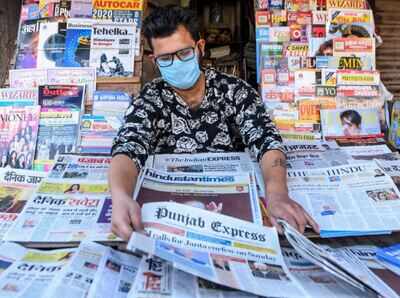Top Searches
- News
- India News
- Clear outstanding ad bills of ministries, INS urges govt
Clear outstanding ad bills of ministries, INS urges govt

Dues totalling more than Rs 350 crore have not been paid to DAVP by various central ministries despite repeated requests by the INS and the Association of Radio Operators of India (AROI), which have demanded release of outstanding money for the bleeding print and broadcast sectors.
Industry sources said some pending payments related to ad campaigns nearly 4-5 years ago. The health ministry, sources said, owes over Rs 61 crore to DAVP.
The Advertising Agencies Association of India (AAAI) echoed INS’s demand for a bailout package, requesting the government to allow advertisers to treat advertising money as investments and allow it to spread expenditure incurred in advertising over three years.
AAAI’s demands for government intervention comes on the heels of persistent requests by media organisations to the Centre to clear outstanding DAVP dues and announce a bailout package for the industry.
AAAI has sought the government’s intervention to permit a loaded deduction of 200% on advertising expenditure, a move that is likely to encourage advertisers, both publicly listed and private, to advertise sooner and essay a faster economic recovery.
In a letter to the Union government, the AAAI also demanded that the government clear its outstanding bills by way of income tax and GST refunds. To help the industry, AAAI said payments should not be taxed, and directions should be given to banks and advertising sector’s debtors to provide cash flow to meet essential expenses.
Demands for relief packages have also been raised by Indian Broadcasting Foundation (IBF) and News Broadcasters Association (NBA). While INS sought removal of 5% customs duty on newsprint, two-year tax holiday for newspaper establishments, 50% increase in DAVP advertisement rates and 100% increase in budget spend for print media, NBA sought waiver of 18% GST on advertisements, or for it to be lowered to 5% to bring it on par with print media.
News-gathering and fact-checking is a sprawling, costly and challenging exercise even in normal times. In times of conflict and crisis, such as the Covid pandemic, journalists put their lives at risk to ensure that readers get news that is first-hand and authentic. But Google and Facebook get the benefit of all the cost — financial and otherwise — incurred by traditional media houses without investing anything at all in news operations. As the Australian government has said, this has created an uneven playing field and stifled competition. It’s not only patently unfair, it is dangerous. If newspapers and TV channels collapse owing to the ongoing economic crisis, most people will get their news from social media. As we have unfortunately seen far too often, social media thrives on fake news and rumours, creating panic and even spurring deadly attacks on innocent people by hysterical mobs. Australia has taken the right decision — one India would do well to emulate.essage